| Listing 1 - 10 of 11 | << page >> |
Sort by
|
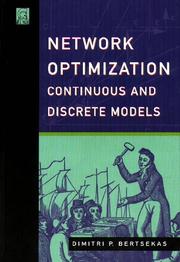
ISBN: 1886529027 9788865290279 9781886529021 8865290277 Year: 1998 Volume: 8 Publisher: Belmont, Mass.: Athena scientific,
Abstract | Keywords | Export | Availability | Bookmark
 Loading...
Loading...Choose an application
- Reference Manager
- EndNote
- RefWorks (Direct export to RefWorks)
Network analysis (Planning) --- Mathematical optimization --- Network analysis (planning) --- 658.4032 --- Optimization (Mathematics) --- Optimization techniques --- Optimization theory --- Systems optimization --- Mathematical analysis --- Maxima and minima --- Operations research --- Simulation methods --- System analysis --- Project networks --- Planning --- Mathematical optimization. --- Network analysis (Planning). --- Acqui 2006
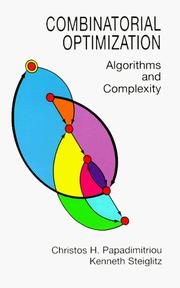
ISBN: 0486402584 9780486402581 Year: 1998 Publisher: Mineola, N.Y.: Dover,
Abstract | Keywords | Export | Availability | Bookmark
 Loading...
Loading...Choose an application
- Reference Manager
- EndNote
- RefWorks (Direct export to RefWorks)
This clearly written, mathematically rigorous text includes a novel algorithmic exposition of the simplex method and also discusses the Soviet ellipsoid algorithm for linear programming; efficient algorithms for network flow, matching, spanning trees, and matroids; the theory of NP-complete problems; approximation algorithms, local search heuristics for NP-complete problems, more. All chapters are supplemented by thought-provoking problems. A useful work for graduate-level students with backgrounds in computer science, operations research, and electrical engineering. "Mathematicians wishing a self-contained introduction need look no further."& American Mathematical Monthly. 1982 ed.
Discrete mathematics --- Mathematical optimization --- Combinatorial optimization --- Computational complexity. --- Optimisation mathématique --- Optimisation combinatoire --- Complexité de calcul (Informatique) --- Computational Complexity --- Mathematical optimization. --- Combinatorial optimization. --- Complexity, Computational --- Electronic data processing --- Machine theory --- Optimization, Combinatorial --- Combinatorial analysis --- Optimization (Mathematics) --- Optimization techniques --- Optimization theory --- Systems optimization --- Mathematical analysis --- Maxima and minima --- Operations research --- Simulation methods --- System analysis --- Optimisation mathématique --- Complexité de calcul (Informatique) --- Computational complexity
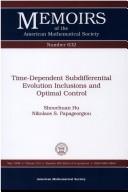
ISSN: 00659266 ISBN: 082180779X Year: 1998 Publisher: Providence, R.I. American Mathematical Society
Abstract | Keywords | Export | Availability | Bookmark
 Loading...
Loading...Choose an application
- Reference Manager
- EndNote
- RefWorks (Direct export to RefWorks)
Mathematical control systems --- Differential equations --- Subdifferentials --- Differential inclusions --- Evolution equations --- Control theory --- Mathematical optimization --- Inclusions différentielles. --- Équations d'évolution. --- Commande, Théorie de la. --- Optimisation mathématique. --- Inclusions, Differential --- Differentiable dynamical systems --- Set-valued maps --- Dynamics --- Machine theory --- Calculus, Subdifferential --- Subdifferential calculus --- Convex functions --- Optimization (Mathematics) --- Optimization techniques --- Optimization theory --- Systems optimization --- Mathematical analysis --- Maxima and minima --- Operations research --- Simulation methods --- System analysis --- Evolutionary equations --- Equations, Evolution --- Equations of evolution
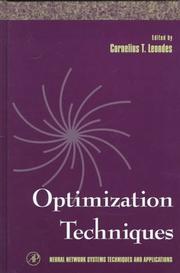
ISBN: 0124438628 9786611038373 1281038377 0080551351 9780080551357 9781281038371 9780124438620 Year: 1998 Publisher: San Diego : Academic Press,
Abstract | Keywords | Export | Availability | Bookmark
 Loading...
Loading...Choose an application
- Reference Manager
- EndNote
- RefWorks (Direct export to RefWorks)
Optimization Techniques is a unique reference source to a diverse array of methods for achieving optimization, and includes both systems structures and computational methods. The text devotes broad coverage toa unified view of optimal learning, orthogonal transformation techniques, sequential constructive techniques, fast back propagation algorithms, techniques for neural networks with nonstationary or dynamic outputs, applications to constraint satisfaction,optimization issues and techniques for unsupervised learning neural networks, optimum Cerebellar Model of Articulation Controller
Computer science. --- Mathematical optimization. --- Neural networks (Computer science). --- Civil & Environmental Engineering --- Engineering & Applied Sciences --- Operations Research --- Neural networks (Computer science) --- Réseaux neuronaux (informatique) --- Optimization (Mathematics) --- Optimization techniques --- Optimization theory --- Systems optimization --- Artificial neural networks --- Nets, Neural (Computer science) --- Networks, Neural (Computer science) --- Neural nets (Computer science) --- Mathematical analysis --- Maxima and minima --- Operations research --- Simulation methods --- System analysis --- Artificial intelligence --- Natural computation --- Soft computing --- Mathematical optimization --- E-books

ISSN: 03029743 ISBN: 9783540645900 354064590X 3540693467 Year: 1998 Volume: 1412 Publisher: Berlin: Springer,
Abstract | Keywords | Export | Availability | Bookmark
 Loading...
Loading...Choose an application
- Reference Manager
- EndNote
- RefWorks (Direct export to RefWorks)
Integer programming --- Combinatorial optimization --- Congresses --- Computer science. --- Algorithms. --- Computer science --- Calculus of variations. --- Combinatorics. --- Computer Science. --- Algorithm Analysis and Problem Complexity. --- Discrete Mathematics in Computer Science. --- Calculus of Variations and Optimal Control; Optimization. --- Mathematics. --- Programming (Mathematics) --- Computer software. --- Computational complexity. --- Mathematical optimization. --- Combinatorics --- Algebra --- Mathematical analysis --- Optimization (Mathematics) --- Optimization techniques --- Optimization theory --- Systems optimization --- Maxima and minima --- Operations research --- Simulation methods --- System analysis --- Complexity, Computational --- Electronic data processing --- Machine theory --- Software, Computer --- Computer systems --- Computer science—Mathematics. --- Isoperimetrical problems --- Variations, Calculus of --- Algorism --- Arithmetic --- Foundations --- Integer programming - Congresses --- Combinatorial optimization - Congresses
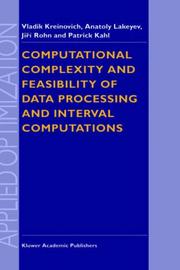
ISBN: 0792348656 144194785X 1475727933 Year: 1998 Volume: 10 Publisher: Dordrecht Kluwer Academic
Abstract | Keywords | Export | Availability | Bookmark
 Loading...
Loading...Choose an application
- Reference Manager
- EndNote
- RefWorks (Direct export to RefWorks)
Targeted audience • Specialists in numerical computations, especially in numerical optimiza tion, who are interested in designing algorithms with automatie result ver ification, and who would therefore be interested in knowing how general their algorithms caIi in principle be. • Mathematicians and computer scientists who are interested in the theory 0/ computing and computational complexity, especially computational com plexity of numerical computations. • Students in applied mathematics and computer science who are interested in computational complexity of different numerical methods and in learning general techniques for estimating this computational complexity. The book is written with all explanations and definitions added, so that it can be used as a graduate level textbook. What this book .is about Data processing. In many real-life situations, we are interested in the value of a physical quantity y that is diflicult (or even impossible) to measure directly. For example, it is impossible to directly measure the amount of oil in an oil field or a distance to a star. Since we cannot measure such quantities directly, we measure them indirectly, by measuring some other quantities Xi and using the known relation between y and Xi'S to reconstruct y. The algorithm that transforms the results Xi of measuring Xi into an estimate fj for y is called data processing.
Programming --- Computer science --- Computational complexity --- Numerical calculations --- Interval analysis (Mathematics) --- Complexité de calcul (Informatique) --- Calculs numériques --- Data processing --- Informatique --- Complexité de calcul (Informatique) --- Calculs numériques --- Computer mathematics. --- Computers. --- Mathematical optimization. --- Mathematical models. --- Applied mathematics. --- Engineering mathematics. --- Computational Mathematics and Numerical Analysis. --- Theory of Computation. --- Optimization. --- Mathematical Modeling and Industrial Mathematics. --- Applications of Mathematics. --- Engineering --- Engineering analysis --- Mathematical analysis --- Models, Mathematical --- Simulation methods --- Optimization (Mathematics) --- Optimization techniques --- Optimization theory --- Systems optimization --- Maxima and minima --- Operations research --- System analysis --- Automatic computers --- Automatic data processors --- Computer hardware --- Computing machines (Computers) --- Electronic brains --- Electronic calculating-machines --- Electronic computers --- Hardware, Computer --- Computer systems --- Cybernetics --- Machine theory --- Calculators --- Cyberspace --- Computer mathematics --- Electronic data processing --- Mathematics --- Computational complexity. --- Data processing. --- Analysis, Interval --- Arithmetic, Interval --- Interval arithmetic --- Interval mathematics --- Mathematics, Interval --- Numerical analysis --- Complexity, Computational
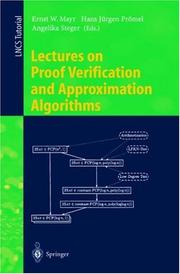
ISSN: 03029743 ISBN: 3540642013 9783540642015 3540697012 Year: 1998 Volume: 1367 Publisher: Berlin: Springer,
Abstract | Keywords | Export | Availability | Bookmark
 Loading...
Loading...Choose an application
- Reference Manager
- EndNote
- RefWorks (Direct export to RefWorks)
During the last few years, we have seen quite spectacular progress in the area of approximation algorithms: for several fundamental optimization problems we now actually know matching upper and lower bounds for their approximability. This textbook-like tutorial is a coherent and essentially self-contained presentation of the enormous recent progress facilitated by the interplay between the theory of probabilistically checkable proofs and aproximation algorithms. The basic concepts, methods, and results are presented in a unified way to provide a smooth introduction for newcomers. These lectures are particularly useful for advanced courses or reading groups on the topic.
Algorithmes (Ordinateur) --- Algoritmen (Computer) --- Approximatietheorie --- Approximation theory --- Automatic theorem proving --- Computer algorithms --- Theorema's--Automatische bewijsvoering --- Théorie des approximations --- Théorèmes--Démonstration automatique --- Computer Science --- Engineering & Applied Sciences --- Theory of approximation --- Automated theorem proving --- Theorem proving, Automated --- Theorem proving, Automatic --- Computer science. --- Computers. --- Algorithms. --- Computer science --- Calculus of variations. --- Combinatorics. --- Computer Science. --- Theory of Computation. --- Algorithm Analysis and Problem Complexity. --- Discrete Mathematics in Computer Science. --- Computation by Abstract Devices. --- Calculus of Variations and Optimal Control; Optimization. --- Mathematics. --- Information theory. --- Computer software. --- Computational complexity. --- Mathematical optimization. --- Optimization (Mathematics) --- Optimization techniques --- Optimization theory --- Systems optimization --- Mathematical analysis --- Maxima and minima --- Operations research --- Simulation methods --- System analysis --- Complexity, Computational --- Electronic data processing --- Machine theory --- Software, Computer --- Computer systems --- Communication theory --- Communication --- Cybernetics --- Combinatorics --- Algebra --- Informatics --- Science --- Computer science—Mathematics. --- Isoperimetrical problems --- Variations, Calculus of --- Algorism --- Arithmetic --- Automatic computers --- Automatic data processors --- Computer hardware --- Computing machines (Computers) --- Electronic brains --- Electronic calculating-machines --- Electronic computers --- Hardware, Computer --- Calculators --- Cyberspace --- Foundations
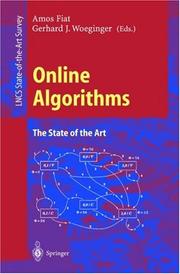
ISBN: 3540683119 3540649174 Year: 1998 Volume: 1442 Publisher: Berlin, Heidelberg : Springer Berlin Heidelberg : Imprint: Springer,
Abstract | Keywords | Export | Availability | Bookmark
 Loading...
Loading...Choose an application
- Reference Manager
- EndNote
- RefWorks (Direct export to RefWorks)
This coherent anthology presents the state of the art in the booming area of online algorithms and competitive analysis of such algorithms. The 17 papers are carefully revised and thoroughly improved versions of presentations given first during a Dagstuhl seminar in 1996. An overview by the volume editors introduces the area to the reader. The technical chapters are devoted to foundational and methodological issues for the design and analysis of various classes of online algorithms as well as to the detailed evaluation of algorithms for various activities in online processing, ranging from load balancing and scheduling to networking and financial problems. An outlook by the volume editors and a bibliography listing more than 750 references complete the work. The book is ideally suited for advanced courses and self-study in online algorithms. It is indispensable reading for researchers and professionals active in the area.
Online algorithms --- Computer Science --- Engineering & Applied Sciences --- Computer science. --- Computer communication systems. --- Computer programming. --- Algorithms. --- Computer science --- Calculus of variations. --- Computer Science. --- Computer Communication Networks. --- Algorithm Analysis and Problem Complexity. --- Programming Techniques. --- Discrete Mathematics in Computer Science. --- Calculus of Variations and Optimal Control; Optimization. --- Mathematics. --- Isoperimetrical problems --- Variations, Calculus of --- Maxima and minima --- Computer mathematics --- Discrete mathematics --- Electronic data processing --- Algorism --- Algebra --- Arithmetic --- Computers --- Electronic computer programming --- Electronic digital computers --- Programming (Electronic computers) --- Coding theory --- Communication systems, Computer --- Computer communication systems --- Data networks, Computer --- ECNs (Electronic communication networks) --- Electronic communication networks --- Networks, Computer --- Teleprocessing networks --- Data transmission systems --- Digital communications --- Electronic systems --- Information networks --- Telecommunication --- Cyberinfrastructure --- Network computers --- Informatics --- Science --- Mathematics --- Foundations --- Programming --- Distributed processing --- Computer software. --- Computational complexity. --- Mathematical optimization. --- Optimization (Mathematics) --- Optimization techniques --- Optimization theory --- Systems optimization --- Mathematical analysis --- Operations research --- Simulation methods --- System analysis --- Complexity, Computational --- Machine theory --- Software, Computer --- Computer systems --- Computer science—Mathematics. --- Computer networks.
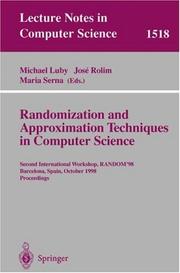
ISSN: 03029743 ISBN: 354065142X 9783540651420 3540495436 Year: 1998 Volume: 1518 Publisher: Berlin: Springer,
Abstract | Keywords | Export | Availability | Bookmark
 Loading...
Loading...Choose an application
- Reference Manager
- EndNote
- RefWorks (Direct export to RefWorks)
Computer science --- Computer Science --- Engineering & Applied Sciences --- Statistical methods --- Congresses --- Informatics --- Computer science. --- Data structures (Computer science). --- Algorithms. --- Mathematical statistics. --- Calculus of variations. --- Combinatorics. --- Computer Science. --- Algorithm Analysis and Problem Complexity. --- Discrete Mathematics in Computer Science. --- Data Structures. --- Calculus of Variations and Optimal Control; Optimization. --- Probability and Statistics in Computer Science. --- Mathematics. --- Science --- Computer software. --- Computational complexity. --- Data structures (Computer scienc. --- Mathematical optimization. --- Combinatorics --- Algebra --- Mathematical analysis --- Optimization (Mathematics) --- Optimization techniques --- Optimization theory --- Systems optimization --- Maxima and minima --- Operations research --- Simulation methods --- System analysis --- Complexity, Computational --- Electronic data processing --- Machine theory --- Software, Computer --- Computer systems --- Computer science—Mathematics. --- Mathematics --- Statistical inference --- Statistics, Mathematical --- Statistics --- Probabilities --- Sampling (Statistics) --- Isoperimetrical problems --- Variations, Calculus of --- Information structures (Computer science) --- Structures, Data (Computer science) --- Structures, Information (Computer science) --- File organization (Computer science) --- Abstract data types (Computer science) --- Algorism --- Arithmetic --- Foundations --- Computer science - Statistical methods - Congresses

ISBN: 0792381122 9780792381129 Year: 1998 Publisher: Boston: Kluwer Academic Publishers,
Abstract | Keywords | Export | Availability | Bookmark
 Loading...
Loading...Choose an application
- Reference Manager
- EndNote
- RefWorks (Direct export to RefWorks)
Decision Making --- Fuzzy sets --- Mathematical optimization. --- 519.2 --- 519.8 --- 681.3*I51 <063> --- Probability. Mathematical statistics --- Operational research --- Models: deterministic; fuzzy set; geometric; statistical; structural (Patternrecognition)--Congressen --- Decision-making. --- Fuzzy sets. --- Basic Sciences. Mathematics --- Mathematical Models, Simulation Models --- Mathematical Models, Simulation Models. --- 519.8 Operational research --- 519.2 Probability. Mathematical statistics --- 681.3*I51 <063> Models: deterministic; fuzzy set; geometric; statistical; structural (Patternrecognition)--Congressen --- Decision making. --- Decision-making --- Mathematical optimization --- Optimization (Mathematics) --- Optimization techniques --- Optimization theory --- Systems optimization --- Mathematical analysis --- Maxima and minima --- Operations research --- Simulation methods --- System analysis --- Sets, Fuzzy --- Fuzzy mathematics --- Set theory --- Deciding --- Decision (Psychology) --- Decision analysis --- Decision processes --- Making decisions --- Management --- Management decisions --- Choice (Psychology) --- Problem solving --- Decision making
| Listing 1 - 10 of 11 | << page >> |
Sort by
|

 Search
Search Feedback
Feedback About UniCat
About UniCat  Help
Help News
News